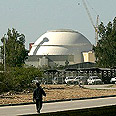
U.S.: U.N. Iran hearing to start next week
Senior American diplomat tells Congress Iran has not met conditions at IAEA, therefore new phase of diplomacy to be started at Security Council next Monday or Tuesday; says Iran 'directly threatens vital American interests'
"Iran has not met the conditions at the IAEA (International Atomic Energy Agency)," Assistant Secretary of State Nicholas Burns told the House of Representatives Committee on International Relations.
"We will therefore start a new phase of diplomacy -- action by the U.N. Security Council starting next week," he said.
Burns declared that Iran "directly threatens vital American interests" and said that in the Security Council "we plan a concerted approach ... that gradually escalates pressure on Iran."
The United States, Britain, France and Germany are seeking a referral to the UN Security Council at a meeting of the IAEA in Vienna.
'Strong statement'
Washington believes the Iranian nuclear program is hiding efforts to make an atomic bomb. Tehran insists its research is peaceful.
"The UN Security Council is the right place to intensify the international debate on Iran's nuclear ambitions," Burns said.
"We will shine a bright spotlight on Iran's nuclear program. We intend to participate in a vigorous international debate about Iran's nuclear ambitions," he added.
Burns said the Security Council would make a strong statement about Iran and that if the Iranian government does not "accede to the wishes of the international community, then of course we would have to look at possible targeted sanctions, which a number of countries are already beginning to explore."
He said any sanctions "will be specifically targeted to pressure the regime and Iran's nuclear and missile programs, rather than hurting the great majority of innocent Iranians."
Meanwhile, Russian Foreign Minister Sergei Lavrov said on Wednesday that imposing U.N.
Security Council sanctions on Iran would be ineffective in convincing Tehran to curb its nuclear ambitions.
'Cool-headed approach needed'
Lavrov, speaking to reporters after talks with U.N. Secretary-General Kofi Annan, also ruled out a military solution to the Iran crisis.
"We are convinced that there is no military solution to this crisis," Lavrov said, saying that British and German officials had publicly stated they shared that view.
"I don't think sanctions as a means to solve a crisis have ever achieved a goal in the recent history," he said.
IAEA chief Mohamed ElBaradei urged Western and Iranian leaders to "Lower the rhetoric" in the standoff over Iran's nuclear work, adding that "What we need now at this stage is a cool-headed approach, to lower the rhetoric. The Middle East is a very volatile area."










